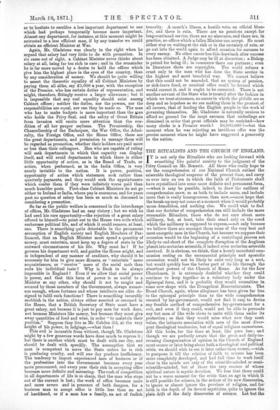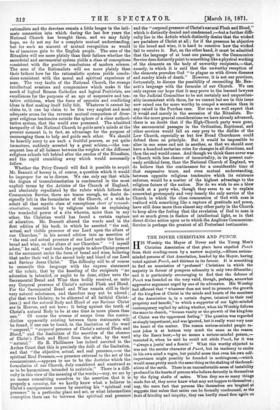THE RITUALISTS AND THE CHURCH OF ENGLAND.
IT is not only the Ritualists who are looking forward with something like painful anxiety to the judgment of the Privy Council on Mr. Bennett. All those who really hope to see the comprehension of our National Church outlast the miserable theological suspense of the present time, and carry us over into an era in which the faith of Protestants shall have crystallized into some more definite and permanent form, —when it may be possible, indeed, to draw the outlines of comprehension anew, so as both to include more, and include- more that is really homogeneous, than now,—must hope that the break-up may not come at a moment when it would probably mean demolition, and nothing else. We could wish to find that our doctrine of comprehension can still include the more reasonable Ritualists, those who do not care about mere- millinery, but, at least, take their stand only on the creed which the millinery is supposed to express,—not only because- we believe there are amongst them some of the very best and most energetic men in the Church, but because we suppose their secession would be the beginning of a centrifugal process not likely to end short of the complete disruption of the Anglican planet into sectarian asteroids if indeed even sectarian asteroids survived. It is obvious, we think, that a keenly sacerdotal com- munion resting on the sacramental principle and apostolic succession would not be likely to exist very long as a sect, but would quickly lose the better part of its life through the absorbent powers of the Church of Rome. As for the Low Churchmen, it is extremely doubtful whether they could continue to keep together as a voluntary body under the- Episcopal form, and it is probable they would recombine in, some new shape with the Evangelical Nonconformists. The Broad Church, again, whose allegiance has been given far les& to the episcopal principle than to the wide comprehension ensured by lay-government, would not find it easy to devise any feasible method of comprehensive lay-government for a sect, and even if they could, would not be able to persuade any but men of like wide views to unite with them under its protection ; so that they would miss what now they most value, the intimate association with men of the most diver- gent theological tendencies, but of equal religious earnestness. All this looks, for the time at least, like pure loss ; and though we are perfectly aware that the great and daily-in- creasing disorganization of opinion in the Church of England must sooner or later bring about both a theological and political crisis, we should wish to see it later rather than sooner,—wish to postpone it till the relation of faith to science has been more completely developed, and had full time to work itself clear in the minds not only of the scientific-minded or semi- scientific-minded, but of those the very essence of whose spiritual nature is mystic devotion. We fear that there could not be a worse moment for the crisis than an age in which it is still possible for science, in the ardour of its new discoveries, to ignore or almost ignore the province of religion, and for' faith in the depth of its devout mysticism quite to ignore the plain drift of the daily discoveries of science. Let but the
rationalists and the devotees remain a little longer in the inti- mate connection into which during the last few years the National Church has brought them, and we may fairly hope, we do not say for a complete mutual understanding, but for such an amount of mutual recognition as would be of immense gain to the English people. The sons of the Ritualists will see more plainly than their fathers whether the sacerdotal and sacramental system yields a class of conceptions consistent with the positive conclusions of modern science. The sons of the Rationalists will see more plainly than their fathers how far the rationalistic system yields conclu- sions consistent with the moral and spiritual experience of man. The very faults of the National Church, the strange intellectual evasions and compromises which make it the mock of logical Roman Catholics and logical Positivists, are excellences for the purposes of an age of suspensive and ten- tative criticism, when the force of opposite and conflicting ideas is first making itself fully felt. Whatever it cannot lay claim to, it can lay claim to be the very amplest and most adequate arena for the reverent mutual comparison of diver- gent religious tendencies outside the sphere of a clear authori- tative system, that the world ever possessed. The admitted incapacity of the National Church to guide men's minds at the present moment is, in fact, an advantage for the purpose of encouraging them to help and guide each other. We should be heartily sorry to see such a fruitful process, as yet quite immature, suddenly arrested by a great schism,—the con- sequent loss of all balance between the weights of the different religious schools left behind after the exodus of the Ritualists, and the rapid crumbling away which would necessarily follow.
Whether the Privy Council will find it possible to acquit Mr. Bennett of heresy is, of course, a question which it would
be improper for us to discuss. We can only say that while the dogma of transubstantiation is condemned in the most explicit terms by the Articles of the Church of England, and absolutely repudiated by the rubric which follows the Communion Service, there are traces enough, no doubt de- signedly left in the formularies of the Church, of a wish to admit all that mystic class of conceptions short of transub- stantiation, resorted to by religious minds as explaining the wonderful power of a rite wherein, more than in any ether, the Christian world has found a certain rapture a adoration. Mr. Bennett altered the words used in the first edition of his book, in which he asserted "the real, actual, and visible presence of our Lord upon the altars of our Churches," in his second edition into an assertion of "the real and actual presence of our Lord under the form of bread and wine, on the altars of our Churches." "I myself adore," he said, "and teach the people to adore Christ present in the sacrament under the form of bread and wine, believing that under their veil is the sacred body and blood of our Lord and Saviour Jesus Christ." The difficulty will be of course to reconcile this language with the express statement a the rubric, that by the kneeling of the recipients no adoration is intended, or ought to be done, either unto the Sacramental Bread and Wine then bodily received, or unto any Corporal presence of Christ's natural Flesh and Blood. For the Sacramental Bread and Wine remain still in their very natural substances, and therefore may not be adored ; (for that were Idolatry, to be abhorred of all faithful Christ- ians ;) and the natural Body and Blood of our Saviour Christ are in Heaven, and not here ; it being against the truth of Christ's natural Body to be at one time in more places than one." Of course the avenue of escape from the contra- 'diction apparently existing between these statements will be found, if one can be found, in the limitation of the word s" corporal," "corporal presence of Christ's natural Flesh and Blood," and the limitation of the assertion of the absence of Christ's Flesh and Blood from the altar, by the word -" natural." Sir R. Phillimore has indeed asserted in the Arches Court that this is precisely the drift of the limitation, and that "the objective, actual, and real presence,—or the spiritual Real Presence,—a presence external to the act of the communicant,—appears to me to be the doctrine which the formularies of our Church, duly considered and construed so as to be harmonious, intended to maintain." There is a diffi- culty in this view of the meaning of the words;—nay, we are by no means committing ourselves to the assertion that it is properly a meaning, for we hardly know what a believer in Christ's omnipresence means by asserting his "spiritual real presence" in a particular place and act, or what intermediate conception there can be between the spiritual real presence
and the "corporal presence of Christ's natural Flesh and Blood," which is distinctly denied and condemned ;—but a further diffi- culty lies in the Article which distinctly denies that the wicked are partakers of Christ at all ; for if the presence be objective in the bread and wine, it is hard to conceive how the wicked fail to receive it. But, on the other hand, it must be admitted that the language of at least one passage in the Communion Service does distinctly point to something like a physical working of the elements on the body of unworthy recipients,—that, namely, in which it is said that the unworthy reception of the elements provokes God "to plague us with divers diseases and sundry kinds of death." However, it is not our province, fortunately, to discuss the possibility of reconciling Mr. Ben- nett's language with the formula of our Church. We can only express our hope that it may prove to the learned lawyers on the Judicial Committee to be not certainly and unquestion- ably inconsistent with them, for we cannot but see in this issue now raised one far more worthy to compel a secession than in any raised in the Purchas case. Nor can we well expect that it would end merely in the secession of the Ritualists. Be- sides the more general considerations we have already advanced, there is no doubt that if the High-Church party were gone, the sacramental passages in the Ordination, Baptismal, and other services would fall an easy prey to the dislike of the Low Church, especially as but few Broad Churchmen could defend them on principle. But it would be impossible to alter in one sense and not in another, so that we should soon have a hundred sectarian cries for changes in all directions, and then the end would come. And though we think there never was a Church with less chance of immortality, in its present curi- ously artificial form, than the National Church of England, we do believe that the continuance for a considerable time of that suspensive truce, and even mutual understanding, between opposite religious tendencies which its existence enforces, would be a matter of the highest advantage to the religious future of the nation. Nor do we wish to see a blow struck at a party who, though they seem to us to explain somewhat grotesquely and very lamely the only service of the Church in which the close communion of God with man is realized with something like a rapture of gratitude and peace, have still done more than almost any other party in the Church to keep alive the feeling that the revelation of God to man is not so much given in flashes of intellectual light, as in that direct divine action upon us to which the Anglican Communion- Service is perhaps the greatest of all Protestant testimonies.



































 Previous page
Previous page